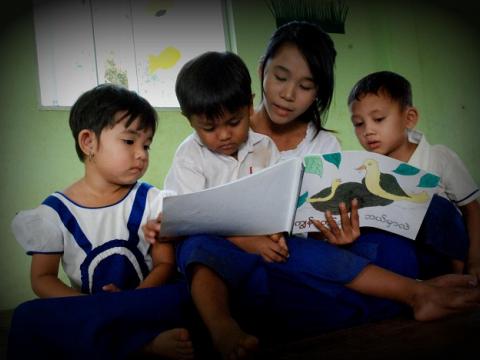Enhancing early years education helps Khant grow up healthy and strong

Leaving the main tar road, our vehicle’s wheels bump along a dusty road boardered by golden paddy fields, leading us to the small village of about 120 households. It is 12 miles away, a 45-minute drive, from Laungloon Township, Thannitharyi Region in Southern Myanmar. As the car doors open we are promptly hit by sweltering heat.
Charming children in white and blue uniforms peek out from centre, excited to greet and welcome us.
Children’s cheerful voices and songs meet our ears, drawing our curiosity, as we approach the Early Childhood Care and Development (ECCD) centre. Charming children in white and blue uniforms peek out from centre, excited to greet and welcome us. One of those children is four-year-old, Khant.
In April, 2014, World Vision introduced an ECCD programme in collaboration with the Community Based Organisation (a development volunteer group) in Khant’s village, including providing training and salaries for two caregivers.
The early years of a child’s life have a significant impact on their physical, behavioural, and social development. A lack of fundamental resources in early childhood may lead to improper growth. Thus, World Vision focuses programming to enhance the early years with positive, responsive family relationships, which build a healthy brain and offer a strong foundation for learning and health.
Khant’s mother, Daw Poe Htway, has noticed changes in her four-year-old in just a year of participating in the ECCD centre’s programmes. “Khant sometimes refused to eat and was reluctant to listen to me,” says Daw Poe. “Now he eats properly...He has learned manners, recites poems and learned how to make friends. He always washes his hands before taking meals and always reminds us to do the same.”
Two years ago, the situation in Khant and his mother’s community was very different. Most of the people in this village are farmers. While parents were working in the fields, sometimes children, especially children under the age of five, were left at home with their neighbours, or would have to join their parents in the fields.
Above: Khant’s parents earn money from growing vegetables, like corn, cucumber, cauliflower, okras and beans and selling them in the markets. (Photo credit: Thet Kaung Myat Oo / World Vision)
The ECCD centre provides children with routines, such as playing together in a group, learning songs and traditional dancing. The children also have naptime, to make sure they are rested and full of energy when the wake up. All of these activities help keep the children healthy – physically, emotionally and developmentally.
"Before we had the ECCD centre in our village, children just played around on the dusty roads or in the fields,” says U Kyi, a 62-year-old villager.
“In early days at ECCD, most of the children did not know how to eat properly and how to wash their hands before meals and after using toilet, but now they know well how to eat and wash their hands properly,” says Daw Thida, an ECCD caregiver.
Not only do children have good opportunities for systematic learning and development, the ECCD centre also prepares them for their primary education.